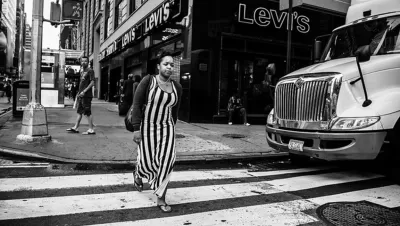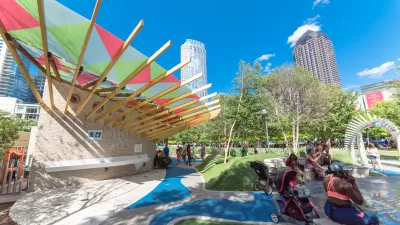You know what racial equity means, but have you heard of 'experiential equity'? Environmental neuroscientist Robin Mazumder explains the term and how it can inform our understanding of equity in the built environment.

Robin Mazumder is breaking new ground in the field of environmental neuroscience, studying the ways in which people experience stress in urban environments. Now, the coronavirus pandemic has added a sense of urgency to Mazumder's research in light of social distancing recommendations that highlight the importance of shared outdoor spaces.
Mazumder's piece illustrates the potential of a young field of study and the author's own focus on racial equity and the study of the lived experiences of marginalized groups. As Mazumder writes, "my experiences of both marginalisation and privilege elucidated the complexity of the human experience, and how that experience can be shaped by barriers created in our social and physical environments. I bring these experiences to my research in environmental neuroscience, where I examine the psychological impacts of our social and physical environments."
Mazumder's work hinges on an important consideration: that not all people experience the built environment and public space in the same way. The pandemic has amplified stress as well as the role of public space to mitigate that stress. Moreover, the recent protests against police brutality and anti-Black racism have "demonstrated the importance of how access to public space can support well-being, the protests demand we ask to whom that public space is open and accessible," says Mazumder.
Pointing to the work of such Black scholars as W. E. B. Du Bois, Dr. Rodney Clark, and Kimberlé Crenshaw, Mazumder acknowledges the role of disciplinary collaboration in furthering the understanding of disparate experiences of the built environment.
Mazumder posits a new term, experiential equity, to "acknowledge the psycho-spatial disparities that exist in the human experience of public space and the associated violence to the body and mind that are caused by these disparities."
Plans are being made to employ the experiential equity framework to inform work on the City of Edmonton’s Zoning Bylaw Renewal for which Mazumder is an advisor.
"This work has just begun and I am keen, and hopeful, that it will provide a tangible example of how experiential equity can be used to facilitate societal change, and to help create urban environments that account for and support everyone’s dignity and well-being," says Mazumder.
FULL STORY: Public spaces are essential – but not yet equal

Maui's Vacation Rental Debate Turns Ugly
Verbal attacks, misinformation campaigns and fistfights plague a high-stakes debate to convert thousands of vacation rentals into long-term housing.

Planetizen Federal Action Tracker
A weekly monitor of how Trump’s orders and actions are impacting planners and planning in America.

Chicago’s Ghost Rails
Just beneath the surface of the modern city lie the remnants of its expansive early 20th-century streetcar system.

Bend, Oregon Zoning Reforms Prioritize Small-Scale Housing
The city altered its zoning code to allow multi-family housing and eliminated parking mandates citywide.

Amtrak Cutting Jobs, Funding to High-Speed Rail
The agency plans to cut 10 percent of its workforce and has confirmed it will not fund new high-speed rail projects.

LA Denies Basic Services to Unhoused Residents
The city has repeatedly failed to respond to requests for trash pickup at encampment sites, and eliminated a program that provided mobile showers and toilets.
Urban Design for Planners 1: Software Tools
This six-course series explores essential urban design concepts using open source software and equips planners with the tools they need to participate fully in the urban design process.
Planning for Universal Design
Learn the tools for implementing Universal Design in planning regulations.
planning NEXT
Appalachian Highlands Housing Partners
Mpact (founded as Rail~Volution)
City of Camden Redevelopment Agency
City of Astoria
City of Portland
City of Laramie





























